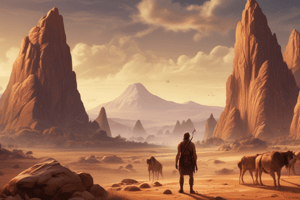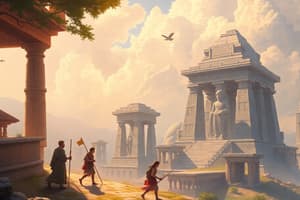Podcast
Questions and Answers
What was the primary characteristic of prehistoric societies?
What was the primary characteristic of prehistoric societies?
- Nomadic hunter-gatherer societies (correct)
- Feudal monarchies
- Settled agricultural communities
- Nation-states
Which ancient civilization is credited with the development of writing?
Which ancient civilization is credited with the development of writing?
- Ancient Greece
- Ancient Egypt
- Mesopotamia (correct)
- Ancient Rome
What was a significant feature of Ancient Greece?
What was a significant feature of Ancient Greece?
- City-states and democracy (correct)
- Pharaonic dynasties
- Industrial Revolution
- Feudalism and monarchies
What was the primary characteristic of the Middle Ages?
What was the primary characteristic of the Middle Ages?
What was a significant feature of the Early Modern Period?
What was a significant feature of the Early Modern Period?
What was a primary characteristic of the Modern Period?
What was a primary characteristic of the Modern Period?
What is a characteristic of the Contemporary Period?
What is a characteristic of the Contemporary Period?
Which of the following periods is characterized by the rise of Christianity and Islamic empires?
Which of the following periods is characterized by the rise of Christianity and Islamic empires?
Flashcards are hidden until you start studying
Study Notes
Prehistory
- Spanned from emergence of humans to development of writing (c. 3000 BCE)
- Characterized by:
- Nomadic hunter-gatherer societies
- Development of tools and language
- Early agriculture and settlement
Ancient Civilizations
- Mesopotamia (c. 3500 - 500 BCE):
- Sumerians, Akkadians, Babylonians, and Assyrians
- Developed writing (cuneiform), cities, and governance
- Ancient Egypt (c. 3100 - 300 BCE):
- Pharaonic dynasties, pyramids, and hieroglyphics
- Developed agriculture, architecture, and trade
- Ancient Greece (c. 800 - 146 BCE):
- City-states (Athens, Sparta), democracy, and philosophy
- Developed theater, art, and science
- Ancient Rome (c. 753 BCE - 476 CE):
- Republic and empire, law, and governance
- Developed architecture, engineering, and language (Latin)
Middle Ages
- Period of European history from 5th to 15th century
- Characterized by:
- Feudalism and monarchies
- Rise of Christianity and Islamic empires
- Limited economic and cultural growth
Early Modern Period
- 15th to 18th century
- Characterized by:
- Renaissance and Enlightenment
- Age of Exploration and colonization
- Development of nation-states and modern science
Modern Period
- 19th to 20th century
- Characterized by:
- Industrial Revolution and urbanization
- Rise of nationalism, imperialism, and totalitarianism
- World Wars I and II, and Cold War
Contemporary Period
- Late 20th century to present
- Characterized by:
- Globalization and technological advancements
- Rise of international organizations and global governance
- Ongoing conflicts and challenges
Prehistory
- Emergence of humans to development of writing (c. 3000 BCE)
- Nomadic hunter-gatherer societies characterized prehistory
- Development of tools and language marked this period
- Early agriculture and settlement also emerged during this time
Ancient Civilizations
Mesopotamia
- Existed from c. 3500 to 500 BCE
- Sumerians, Akkadians, Babylonians, and Assyrians developed this civilization
- Cuneiform writing was developed in Mesopotamia
- City governance and development were key features of Mesopotamia
Ancient Egypt
- Lasted from c. 3100 to 300 BCE
- Pharaonic dynasties built pyramids and developed hieroglyphics
- Agriculture, architecture, and trade were key areas of development
- Hieroglyphics were used to convey information and tell stories
Ancient Greece
- Flourished from c. 800 to 146 BCE
- City-states like Athens and Sparta developed democracy and philosophy
- Theatre, art, and science were key areas of achievement
- Socrates, Plato, and Aristotle were notable Greek philosophers
Ancient Rome
- Lasted from c. 753 BCE to 476 CE
- Developed a republic and empire with a system of governance
- Latin language was developed and became widely used
- Architecture and engineering were notable achievements of the Romans
Middle Ages
- Period of European history from 5th to 15th century
- Feudalism and monarchies characterized this period
- Rise of Christianity and Islamic empires were key features
- Economic and cultural growth were limited during this time
Early Modern Period
- Lasted from 15th to 18th century
- Characterized by the Renaissance and Enlightenment
- Age of Exploration and colonization led to global expansion
- Development of nation-states and modern science marked this period
Modern Period
- Lasted from 19th to 20th century
- Industrial Revolution led to urbanization and growth
- Rise of nationalism, imperialism, and totalitarianism were key features
- World Wars I and II, and the Cold War were major global conflicts
Contemporary Period
- Lasted from late 20th century to present
- Characterized by globalization and technological advancements
- Rise of international organizations and global governance
- Ongoing conflicts and challenges persist in this period
Studying That Suits You
Use AI to generate personalized quizzes and flashcards to suit your learning preferences.




